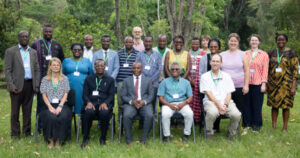What health challenges do pastoral communities in Tanzania face? This question was at the heart of the „One Health on the Move“ workshop on 20 January 2025 in Arusha, Tanzania, – bringing together experts from science, politics, and civil society to explore innovative, transdisciplinary solutions for global health.

As part of the transdisciplinary project of the same name, 25 participants from science, politics and society discussed transdisciplinary research and health issues in East Africa in six interactive sessions, with contributions from scientists, NGOs, politicians and cultural ambassadors.
The workshop began with an introduction to non-linear thinking and the importance of transdisciplinary research for global health issues. Professor Anna-Katharina Hornidge (IDOS) and Dr Saravanan Subramanian (IDOS) presented this strategy as a key to innovative solutions and enabled participants to apply the methods directly.
Professor Gabriel Shirima (Nelson Mandela African Institute of Science and Technology) then addressed disease transmission between humans, livestock and wildlife, particularly zoonotic diseases such as brucellosis, anthrax and Rift Valley fever, as well as the lack of vaccination programmes. Pastoral communities also face challenges from climate change, livestock growth, limited grazing land, migration, land use conflicts and disease transmission through water sources and markets. This was also emphasised by reports from political representatives from the districts of Monduli and Simanjiro.
Professor Anna Tredyte (Stockholm University) and her junior researchers Gladys Lendii, Amana O Kilawi and Janeth Mngulwi analysed ecological challenges such as soil erosion, invasive plant species and water scarcity in the East African rangelands and their connection to climate change. Solutions such as mapping, renaturalisation and sustainable pasture management were discussed.
The NGO Oikos East Africa also presented its strategies for sustainable pasture management, education and community engagement. It became clear that women play a key role in the restoration of pastureland. Dr Saravanan Subramanian and Marie Dovermann (both IDOS) focused on the health situation of pastoral communities in Tanzania and Kenya. In addition to traditional healing methods, the increasing incidence of mental illness and non-communicable diseases was emphasised.
The discussion made it clear that health policy challenges require integrative, contextualised healthcare and greater involvement of the affected communities. In particular, the importance of cross-border cooperation and evidence-based policy-making was emphasised by cultural and political representatives.
The workshop was concluded by Dr Gladness Mwanga (NM-AIST), whose case study showed the changing migration patterns of pastoral communities, which are primarily determined by water availability and seasonal factors. The workshop culminated in a four-day write shop in which the partner institutions jointly developed a four-year project concept. The aim is to analyse the multi-layered risks of pastoral mobility and its impact on global health.

Schreibe einen Kommentar